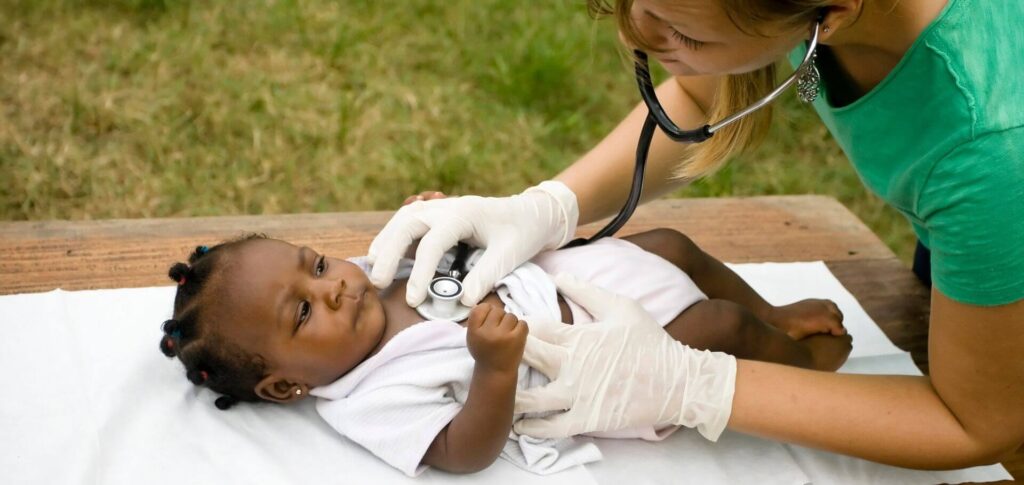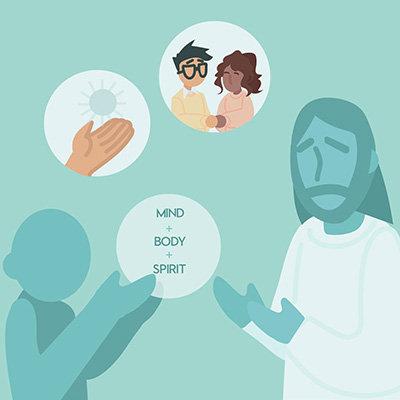Global Health
Pursuing Wholistic Health
Cultural changes have brought the world to a pivotal time in history. One example of such groundbreaking changes occurred in 1978 at a meeting in what is now Almaty, Kazakhstan. A declaration derived from the principles proposed during this gathering, which involved delegates from 134 governments and representatives from 67 United Nations organizations. The declaration was titled ‘Health for All by the Year 2000’.1 The word ‘health’ in this case was based on the definition used by the World Health Organization as follows: ‘Health is a state of complete physical, mental and social wellbeing and not merely the absence of disease or infirmity’.2 This statement was developed to combat the commonly held belief at the time (and arguably still today) that health simply meant one was not ill.
Considerable progress has been made toward this goal, though an immense amount of work remains. We will not be commenting any further than to say the situation may be even more complex than before because of the effects of climate change, the growing crisis of displaced persons, and the geopolitical divisions and politicization of health and the ongoing socioeconomic fallout from the COVID-19 pandemic.
Currently, a Western system of healthcare (more accurately described as a disease management system) is the dominant form of dealing with ‘dis-eased’ humans. It is the system being pursued by (or, one could say, forced upon) most, if not all, parts of the globe. It is a system that disintegrates the human body and reduces the patient’s health complaint to the least by understanding and treating symptoms. It relies on a quick diagnosis (which, of course, is sometimes necessary) and the application of therapy, so that the healthcare provider can proceed to the next case as efficiently as possible. The engine that propels this system is based on a business model that leaves almost no room for true care for the whole person. It is an expensive system that the majority of countries cannot afford to implement. Even in the most developed countries, such as the United States, it is hardly affordable for many to receive high-quality healthcare.
‘Is the church still called to ministries of health, healing, and wholeness?’ The resounding answer was, yes!
This large gathering in Almaty in 1978, in fact, was preceded by a gathering of a meager size in 1964. Some 18 participants from nine nationalities, mostly medical missionaries, met to discuss healing in a Christian context and to answer the question, ‘Is the church still called to ministries of health, healing, and wholeness?’ The resounding answer was, yes! Numerous global consultations followed in various contexts, and those consultations led to the formation of the Christian Medical Commission (CMC) in 1968 within the World Council of Churches (WCC).3 From their offices located in Geneva, members of the CMC met regularly with members of the World Health Organization and had a leading role in the development of what became known as primary health care (PHC). A thorough explanation and promotion of PHC was the centerpiece of the Almaty gathering. The embrace and implementation of PHC principles have had varied uptake globally. For all the talk of the importance of PHC in the US, for example, it is still the reality that the system there is primarily focused on disease treatment, not on prevention and health promotion. Rather than being a healthcare system, it is in reality a disease-management system.
While significant advances have been made in the treatment of disease, there remains a significant deficit in treating the whole person. Emerging technologies are making a cure for cancer more likely, while at the same time the levels of depression and suicide rates are at all-time highs in some parts of the world. Much confusion exists regarding what it means to be and identify as a human being. While technology has made great strides in addressing communicable diseases, it can also be the agent for isolation and loneliness as many seek connection and relationship in the virtual world. The COVID-19 pandemic only accelerated this already developing problem.
Interestingly and more to the point of this article, closely between those two forementioned gatherings in 1964 and 1978, another meeting occurred in Lausanne, Switzerland, in 1974. As most readers are aware, this meeting had world evangelization as its focus. This was indeed a pivotal point in the history of the global church. While many in attendance were comfortable believing that the Great Commission had been achieved since all nation states could be seen to have a church, it was Dr Ralph Winter who pointed out that it is not nation states to which we should give our attention but the ethne (‘people groups’ in Greek) of the world, of which there were an estimated 13,000. This fact sent massive ripples throughout the Christian world and led to numerous and ongoing projects whose focus can be described as finishing the task of world evangelization. The Lausanne Movement is a direct descendant of that gathering. Great gains have been made in reaching the ethne of the world. It is now estimated that around 7,000 such groups remain without a witness to Jesus.4 This comprises more than 40 percent of the eight billion people on this planet. The low hanging fruit has been picked, and the remaining fruit seems just out of reach. What, you might ask, does this have to do with our theme of global health? The remainder of this article will make the connection clear.

Global Health and the Great Commission
Global health is a term not well understood by most. It is not a topic that is often discussed in many of our churches. It may be of interest within mission agencies, though even within those institutions there would typically not be an explanation of what they mean by the term. There would likely be a vague understanding that it has something to do with medical care in developing countries (eg treating patients in clinics and hospitals run by dedicated Christian healthcare professionals). Some may have knowledge of community health efforts being made around the globe. Others may see more of a link with the discipline of public health. Some may even hear it as a term that relates to the health of the planet. We therefore argue that global health is a little-understood term that calls for a clear definition, at least for the global church.
We seek to establish within the church the link between health and the rich Hebrew word shalom. The Greek equivalent would be eirene. Both words are typically translated as ‘peace’, which we commonly interpret to mean an absence of conflict. The ancient Hebrew concept of peace, rooted in the word shalom, means wholeness, completeness, soundness, health, safety and prosperity, and balance, carrying the implication of permanence.5 In other words, it is a wholeness of mind, body, and spirit in one’s social context. Dr Daniel Fountain said it best: ‘Health cannot be defined. It is not simply an object for analysis. To render it such is to think secularly about health. Health is life, a gift we receive, an endowment we are to develop, and a journey we are to pursue. We can observe and analyze much along the way. We can manipulate and improve certain aspects of health and life. But we can never comprehend the whole’.6 In that same work, Dr Fountain develops what can be seen as an understanding of what health is from a biblical perspective.7
Here a biblical example will help us add to our knowledge an understanding that broadens our intellectual model for what health is and how the church is called to the ministry of health, healing, and wholeness. For 12 years the woman in Luke 8:43–48 (also in Matthew 9:20–22 and Mark 5:25-34) had been bleeding. She had spent all she had on doctors who were unable to cure her. By this time she was as much an outcast as any leper. Isolated from her family and community, and quite possibly nearing death from extreme anemia, she was desperate, so much so that she risked everything to touch the hem of Jesus’s cloak, believing it would take away her physical disease. And though physical cure was indeed what happened, it was not going to be the end of the story. Jesus called her out. Undoubtedly with great fear and trembling, perhaps thinking she might be stoned to death for her action, she came forward to explain herself. Can you imagine the relief she had felt when Jesus simply said, ‘Daughter (restoration of her mental health and social standing), your faith has healed you (physical cure). Go in peace (eirene or shalom)’? This is healthcare. This is caring for the whole person in the way that Jesus did in his earthly ministry.
The model Jesus demonstrates to us is what we call Whole Person Care (WPC), an integrated form of care that takes into consideration all aspects of what it means to be a human, that we exist in bodily form with a mind and eternal spirit. To treat one aspect of human ‘dis-ease’ while ignoring the whole is a reductionist approach which in many cases may not truly heal the individual. Is a holistic model of care like WPC being accomplished anywhere in the world?
Historically, hundreds if not thousands of mission hospitals were built in the most difficult regions of the world, many of which persist in their mission to this day. We cannot be sure of the numbers, but many hundreds of these hospitals have closed, have moved away from their original mission focus, or have even been taken over by governments that are not interested in the original intent for which the hospital was built.
There are increasing numbers of Christian community health efforts than ever before (though, again, there are no known statistics on the numbers). In addition, there are many individuals dedicated to bringing the Word to many of the least-reached peoples on the planet through healthcare outreach. Many of the largest sending agencies have numerous healthcare professionals in the field. However, we have yet to find one that fully comprehends the potential of WPC in reaching unreached people groups.

Challenges in Global Health
So far this article has given a very brief picture of the present reality. The world is spending enormous resources in the pursuit of its vision of universal health by using an incomplete understanding of health and taking a reductionist approach to caring for people. There is a growing focus on social determinants of health (SDOH) and even an acknowledgement of the importance of religion as a determinant of health. These are good trends that are to be celebrated, yet they still fall short. The church and her representatives continue to care for the most marginalized and least reached peoples, although her efforts, too, may be limited by a reductionist approach. The church has too often sought to fit herself into the efforts of the world (eg Sustainable Development Goals), rather than being the standard by which all others measure their efforts.
The church has too often sought to fit herself into the efforts of the world (eg Sustainable Development Goals), rather than being the standard by which all others measure their efforts.
We come now to the key element of this article that asks the question: What do we believe to be the most complex global health challenge that the church faces? Is it the persistent lack of access to quality healthcare by the world’s most marginalized? Is it that preventable diseases are still killing millions each year? If we believe that health is related to the integrity of our whole being—mind, body, and spirit—functioning well in our context, then the greatest challenge that the church faces is the fact that around 40 percent of the world’s population does not have the opportunity to achieve such health of the whole person. Why 40 percent? That is the portion of the world that has no access to the good news of Jesus the Messiah.8 The most important aspect of human health is the status of our eternal spirit. If more than three billion people have no access to God’s shalom through a relationship with his son Jesus and with the indwelling of the Holy Spirit, then they cannot experience true health.
We are calling for a great convergence to happen within the church—a convergence of those efforts that seek to accomplish the Great Commission with those who focus on the Greatest Commandment. The former, such as WPC, tends to avoid good works, since it is seen as a distraction from the primary goal of seeing a church amongst all people groups. The latter at times is only focused on healthcare provision in the way of the world, devoid of the ultimate desire to see all come to a saving knowledge of Jesus the Messiah. We do not claim that this convergence is not happening, but we do claim that it is not the dominant approach used by the majority of those seeking to reach the unreached ethne with the good news. We are calling for a response to both the Greatest Commandment (to love) and the Great Commission (to go out to the whole world).

Opportunities for Global Health
Imagine the radical impact the body of Christ could be making if it had a well-developed theology of health that was then being put into practice in the form of true Whole Person Care. Imagine the radical impact our churches could be making if they saw themselves as healing communities not only within their own structure but also in the surrounding communities. If just 10 percent of our churches were functioning as true WPC centers (or we could use the term Christ-Centered Primary Healthcare Centers) while using a team-based approach, the impact would be transformational not just for the communities they serve, but for those individuals involved. Other potential future possibilities are as follows:
- Seminaries have a theology of health integrated into their curriculums, which train church leaders who model healthy living and help their members do the same.
- Christian health science schools have a strong theology of health fully integrated into their curriculum, providing the world with WPC practitioners.
- Churches serve as leading organizations in their community with regards to caring for the present mental health needs.
- Christian healthcare services have a correct understanding of what is most important for helping people live healthy lives, namely that the spiritual wellbeing of a person is of primary importance.
- The witness of the church in providing WPC has an influence over the secular models of disease management and guides them toward a more holistic approach.
- The church engages more fully with implementing WPC as they work among unreached people groups, leading to greater numbers of movements to Jesus.
- Those Christ-centered entities worldwide (eg hospitals, clinics, and community development organizations) that are serving in the neediest regions are equipped with a strategy to build sustainability and avoid unhealthy dependency on external resources.
- Short-term health outreach efforts have the goal of working themselves out of a job.

From Today to 2050
The challenges to seeing the formation of this great convergence will be formidable, but opportunities abound and will not necessarily require the development of any new organizations. Potential challenges include the following:
- Complacency in the church hinders the momentum and fosters ongoing neglect toward her essential calling to truly care for the whole person.
- Seminaries and bible colleges cannot see beyond their past identities to understand what they need to become for the future.
- Health science programs are reluctant to truly develop and implement WPC into their programming, often fearing the accrediting bodies.
- The global church in general does not see the value in research and does not invest in it.
- The strong forces of Westernization and globalization promote an unhealthy lifestyle and diet and seek to enlarge the dominance of a form of healthcare that is no more than disease management.
- The power and influence of a West-dominated health and healthcare movement throughout the world will be difficult to confront.
- Ongoing economic challenges in the low and low middle income countries (LMICs) impede progress on health parameters.
- Hostile contexts—on a local, national, and global scale—snuff out hopes of growth and transformation toward WPC.
Opportunities are numerous:
- Christian networks have global reach to bring the mission of WPC to reality.
- Partnerships can be formed between theological, biblical studies programs and Christian health science programs to help each other integrate a fully biblical understanding of health into the DNA of their schools and programming.
- Christian hospitals can form a global association to network, discuss struggles, and share emerging and best practices for their callings.
- Best practices for short-term healthcare outreach efforts can be embraced and implemented on a greater scale, providing community empowerment that restores dignity and purpose to the community beyond short-term relief.
- Local churches have the opportunity to be a significant provider of PHC using Christ-centered, team-based approaches for WPC in their communities.
- BAM (Business as Mission) workers can partner with hospitals, clinics, and other healthcare providers to think outside the box about sustainable healthcare services in the neediest areas.
- Individuals working in WPC can collaborate for more impact.
- In all of the above, the advancement of WPC can significantly advance the cause of the gospel for every person, disciple-making churches for every people and place, Christlike leaders for every church sector and kingdom impact in every sphere of society.
Such radical changes on so many levels will require resources. What will be needed to continue thinking about and then doing what is proposed?
Of the income earned by Christian families, 98.3 percent goes toward household needs (housing, food, cars, etc.), while 1.7 percent is given to any Christian cause. Of this 1.7 percent, 82 percent goes to local churches and organizations, 12.2 percent to local or national outreach, and 5.8 percent to global foreign missions. Of this 5.8 percent, only 1.8 percent is spent on reaching unreached people groups. In other words, for every 100,000 USD that Christians earn, only 1.70 USD is given toward reaching unreached peoples.9 This must change.
Very little research has been done by the church related to her efforts in helping people become healthy. Until recently, no academic journal had existed with a focus on global health from a biblical worldview. The Christian Journal for Global Health has filled this gap.10 We are not aware of a global health research institute founded and functioning from a biblical worldview, though one is being developed at William Carey International University.11
Resources toward mobilization include the Perspectives on the World Christian Movement course.12 This course has had a tremendous impact on mobilizing thousands to cross-cultural work but has minimal exploration of the role that Christian healthcare outreach has played in introducing the gospel into otherwise closed ethne groups. The Christian Global Health in Perspective course now fills that gap.13
Numerous Christian organizations and networks exist globally.14 In addition, there is the Africa Christian Health Associations Platform, which is comprised of some 44 members.15 In India we have the Emmanuel Hospital Association with more than 20 members.16 Christian Medical Fellowship (CMF) in the UK and, internationally, the International Christian Medical and Dental Association (ICMDA) and IHS Global train healthcare professionals to witness Christ to patients.17 Healthcare Christian Fellowship International serves a similar purpose, with numerous branches globally.18
Within the Lausanne Movement, numerous resources exist at the Health for All Nations page, including an excellent Global Classroom on this topic.19
We encourage forming several pilot programs that seek to embody the principles we promote in this article. These programs could include the following mandate:
- Train and empower sending agencies that are willing to equip and send both short-term and long-term WPC teams to unreached ethne locations. We would prefer at least half of these to be sending agencies formed in and based out of a majority world context.
- Enlist churches that are willing to explore the biblical foundations for WPC, whose members will then implement it in their churches using a team-based approach.
- Proactively build partnerships between seminaries and Christian health science schools, so that they together explore the biblical foundations for a theology of health, and then integrate that theology of health into the core of their programs.
In sum, the vision of global health is a vision of seeing the shalom of Christ experienced amongst all ethne. Amen, and may it be so.
Endnotes
- “Primary Health Care: Report of the International Conference of Primary Health Care,” World HealthOrganization and the United Nations Children’s Fund, September 6–12, 1978, https://www. unicef.org/media/85611/file/Alma-Ata-conference-1978-report.pdf.
- “Constitution,” World Health Organization, May 31, 2019, https://www.who.int/about/governance/constitution.
- Access to the reports from these consultations are available upon request to mjsoderling@gmail.com.
- https://joshuaproject.net/global/progress
- Susan Perlman, “What Is Shalom: The True Meaning,” Inherit, August 27, 2018, https://jewsforjesus.org/publications/inherit/what-is-shalom-the-true-meaning (emphasis added).
- Daniel Fountain, Health, the Bible, and the Church (Wheaton, IL: The Billy Graham Center, 1989), 52.
- A ten-point summary can be found in “What Is Health?” Health for All Nations, https://www.healthforallnations.com/about-what-is-health.html.
- https://joshuaproject.net/people_groups/statistics
- https://www.missionfrontiers.org/issue/article/giving.
- https://journal.cjgh.org.
- https://www.wciu.edu/.
- https://www.perspectives.org/.
- https://www.cghiperspective.com/.
- https://www.healthforallnations.com/resources-links.html.
- https://africachap.org/.
- https://eha-health.org/.
- https://icmda.net/; https://www.ihsglobal.org/.
- https://www.hcfglobal.org/19.https://lausanne.org/networks/health-for-all-nations



